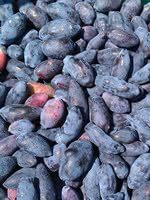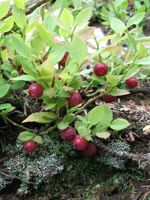Mon-Fri 9am - 5pm Mountain time
Chito Haskap (Honeyberry) vs Grouseberry
Lonicera caerulea Chito
Vaccinium scoparium
NOT AVAILABLE THIS SEASON - MIGHT RETURN
CUSTOM GROW
The Chito Haskap is a fruit-bearing shrub with large, tart-sweet berries that are ready for harvest in late June and into July. This shrub blooms in spring with small white flowers, and has medium-firm berries. Their taste is typically described as something between a raspberry and a blueberry.
The Chito Haskap, or Chito Honeyberry exhibits consistently high fruit yields and makes great for fresh eating or adding to jams and jellies.
Chito is a late pollinating variety. Pair with other late pollinators to have a higher yield.
Strawberry Sensation is a great companion variety.
Grouseberry is a native, low-growing deciduous shrub known for its edible red berries. In early summer, it produces small, urn-shaped flowers ranging from white to pink that attract bees and other pollinators. The berries provide an important food source for many types of wildlife, including game birds such as grouse, which gives the plant its common name. People can also enjoy the berries fresh or in baked goods, though they can be difficult to harvest in large quantities.
Spreading by rhizomes, Grouseberry forms dense, broom-like mats that help stabilize soil and prevent erosion, while also providing cover for ground-nesting wildlife. It is commonly found beneath conifers in open forests, subalpine meadows, and occasionally on rocky slopes in mountainous regions. It is well-suited for naturalization, ecological restoration, and soil stabilization projects.

